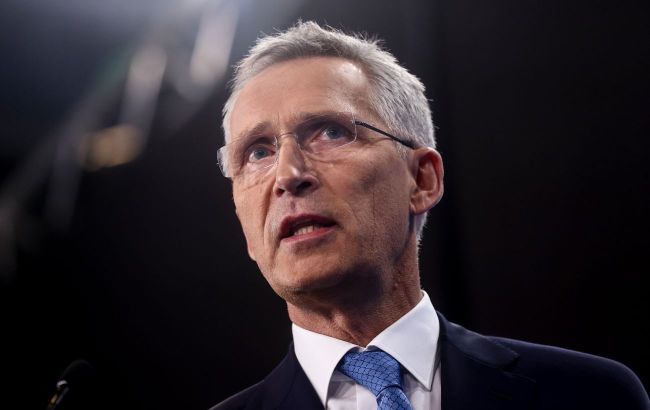Support, irreversibility of membership, and more: Decisions made by NATO summit on Ukraine
 Photo: NATO Secretary General Jens Stoltenberg (Getty Images)
Photo: NATO Secretary General Jens Stoltenberg (Getty Images)
The 75th anniversary NATO summit is taking place in Washington, DC, from July 9 to 11. One of the key issues at the meeting was the strengthening of Ukraine in the context of the Russian-Ukrainian war, the conditions for inviting the country to join the Alliance, and much more.
Read more about what was decided at the NATO summit regarding Ukraine in the RBC-Ukraine report.
Long-term support
NATO reaffirmed its commitment to supporting Ukraine in building a force capable of defeating Russian aggression today and deterring it in the future. To this end, the Allies intend to provide Ukraine with a minimum core funding of €40 billion over the next year and ensure sustainable security assistance.
The commitment covers the costs of providing Ukraine with military equipment, assistance, and training. In particular, this includes:
- the purchase of military equipment for Ukraine;
- financial assistance to Ukraine;
- costs associated with the maintenance, logistics, and transportation of military equipment for Ukraine;
- military training costs for Ukraine;
- operational expenses related to the provision of military support to Ukraine;
- investments in and support for Ukraine's defense infrastructure and defense industry;
- all contributions to NATO trust funds for Ukraine, including non-lethal assistance.
In addition to the military support provided by this pledge, Allies intend to continue to provide political, economic, financial, and humanitarian support to Ukraine.
NSATU
In the Washington Summit Declaration, NATO leaders announced that they had decided to establish a Security Assistance and Training Unit for Ukraine (NSATU) to coordinate the delivery of military equipment and training. Its goal is to put security assistance to Ukraine on a solid footing by providing enhanced, predictable, and coordinated support.
The NSATU, which will operate in Allied countries, will support Ukraine's self-defense following the UN Charter. The newly created service will not make NATO a party to the conflict. It will support the transformation of Ukraine's defense and security forces, ensuring its further integration with NATO.
NATO-Ukraine Joint Analysis, Training and Education Center (JATEC)
In addition, the establishment of the NATO-Ukraine Joint Analysis, Training and Education Center (JATEC), an important pillar of practical cooperation, was expanded to identify and apply the lessons of Russia's war against Ukraine and to increase Ukraine's interoperability with NATO.
Irreversibility of Ukraine's membership in NATO
The NATO Joint Declaration states that Ukraine's future lies in the Alliance. In particular, the country is becoming increasingly operationally and politically integrated with the military bloc.
NATO welcomes the progress that Ukraine has made since the Vilnius summit on the necessary democratic, economic, and security reforms. The Alliance also named the conditions under which Ukraine will be invited to join the military bloc.
"As Ukraine continues this vital work, we will continue to support it on its irreversible path to full Euro-Atlantic integration, including NATO membership. We reaffirm that we will be in a position to extend an invitation to Ukraine to join the Alliance when Allies agree and conditions are met," the statement said.
Criticism of Iran and the DPRK
The leaders of NATO member states criticized Iran and the DPRK, which are fueling Russia's aggressive war against Ukraine by providing direct military support to Russia.
In particular, munitions and UAVs, seriously affect Euro-Atlantic security and undermine the global non-proliferation regime.
"We strongly condemn the DPRK’s exports of artillery shells and ballistic missiles, which are in violation of numerous United Nations Security Council resolutions, and note with great concern the deepening ties between the DPRK and Russia. Any transfer of ballistic missiles and related technology by Iran to Russia would represent a substantial escalation," the document says.
Statement on China
The North Atlantic Alliance made two high-profile statements regarding China. In particular, the declaration says that China has become a decisive factor in Russia's war against Ukraine.
"The PRC has become a decisive enabler of Russia’s war against Ukraine through its so-called “no limits” partnership and its large-scale support for Russia’s defence industrial base. This increases the threat Russia poses to its neighbours and to Euro-Atlantic security," the document says.
In this regard, the Alliance called on China, as a permanent member of the UN Security Council, which has a special responsibility to uphold the purposes and principles of the UN Charter, to cease all material and political support for Russia's military efforts. The document clarified that it was a transfer of dual-use materials. In particular, weapons components, equipment, and raw materials serve as resources for Russia's defense sector.
In addition, NATO said that China continues to pose systemic challenges to Euro-Atlantic security.
"We have seen sustained malicious cyber and hybrid activities, including disinformation, stemming from the PRC. We call on the PRC to uphold its commitment to act responsibly in cyberspace. We are concerned by developments in the PRC’s space capabilities and activities. We call on the PRC to support international efforts to promote responsible space behaviour. The PRC continues to rapidly expand and diversify its nuclear arsenal with more warheads and a larger number of sophisticated delivery systems," the statement says.
NATO called on China to participate in discussions to reduce strategic risks and promote stability through transparency. The Alliance noted that it remains open to constructive engagement with China.
Sources: Washington Summit Declaration

